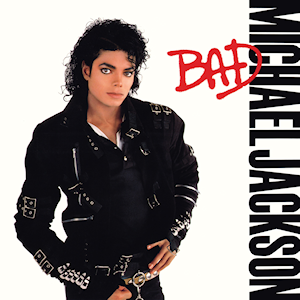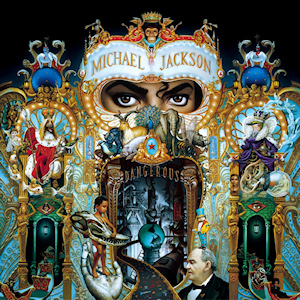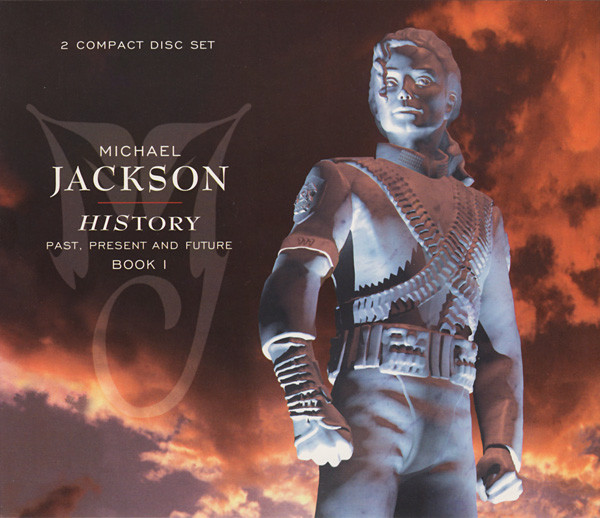Now Playing
Current DJ: Paul LaScolea
Pure X Voices from Pleasure (Acéphale) Add to Collection
Requests? 773-DJ-SONGS or .(JavaScript must be enabled to view this email address)
 by Josh Friedberg
by Josh Friedberg
[Read Part One]
After releasing the best-selling album ever, Thriller, in 1982, the expectations for Michael Jackson’s success were understandably high. So by lots of different measures, 1987’s Bad was inevitably a disappointment, but it also showed Jackson’s growth as a songwriter and an artist.
On Thriller, Jackson wrote four songs out of nine, whereas on Bad, he wrote nine songs out of eleven. And despite the clunky and very dated production, Jackson’s voice, though more strained than on Thriller, performs well throughout, especially on ballads like “Man in the Mirror” and “I Just Can’t Stop Loving You,” a duet with Siedah Garrett. He sounds rougher from the get-go, bragging about his edginess on the opening title track and sounding hellbent on obtaining his object of desire on “The Way You Make Me Feel,” a standout hit from the album.
However, tracks like “Speed Demon” and “Just Good Friends,” a duet with Stevie Wonder, exemplify the worst and most unfortunately ‘80s-sounding tendencies of MJ’s greater creative control. More unique tracks like the consciously exotic-sounding “Liberian Girl” and the dark “Smooth Criminal” sound less stuck in their time and hold up better, especially “Smooth Criinal.” And then there’s “Dirty Diana,” one of Jackson’s strongest performances on the album, but soured by a boatload of cheesy sound effects.
Overall, Bad has several exceptional performances—including “The Way You Make Me Feel” and “Man in the Mirror,” the latter of which features some of his best vocals ever—but I struggle with that production, especially in the album’s first half. Critic Greg Tate wrote that Bad sounds like a series of demos recorded over a long weekend, and there’s plenty on that album to justify that statement. Still, time has been kinder to Bad than one would have expected upon its release: Rolling Stone called it one of the 500 greatest albums of all time and, in a commemorative book after Jackson’s death in 2009, Jackson’s last great album. I would argue that the latter contention, however, is false: Dangerous, Jackson’s next album, ranks among his greatest work.

When Dangerous was released in 1991, Jackson was no longer working with Quincy Jones, as he had for the preceding three albums, instead working with New Jack Swing hotshot producer Teddy Riley. Dangerous is eclectic, incorporating hip hop, gospel, R&B, rock, and more into a 2-LP set clocking in around 78 minutes. It may have seemed like a hodgepodge to many at the time, but Jackson knew what he was doing, as scholar Joseph Vogel noted in an essay published online at PopMatters: he loved to surprise people, including with seemingly odd juxtapositions. With this eclecticism, however, Dangerous holds up well on repeated listens as a cohesive piece of work. From hard-hitting dance tracks like “Jam” to magnificently huge-sounding ballads like “Will You Be There,” this album is arguably a masterpiece.
Author Susan Fast boldly calls Dangerous Jackson’s coming of age album, addressing social injustice, especially racism, like never before. This may be true, but tracks like “Heal the World” and “Give In To Me” are both musically brilliant and disturbing in light of the allegations of sexually abusing children that Jackson would soon face. Yet they are also brilliantly crafted pieces of pop music, with some of Jackson’s most beautiful vocals appearing on “Heal the World” and some of his most convincing rock work on “Give In To Me.” And some of his greatest “paranoid” tracks (think “Billie Jean”) are here as well, especially “Who Is It.” The album’s biggest hit, “Black or White,” features what biographer Steve Knopper calls the greatest guitar riff on a Michael Jackson song, and despite its (dated?) message of colorblindness, Jackson’s address of social injustice is strong here and on tracks like “Gone Too Soon,” written by an outside songwriter for Ryan White, a young man who died of AIDS in 1990.
I should note that every MJ album after 1979’s Off the Wall was edgier and angrier than the one before, so when HIStory: Past, Present and Future, Book 1 came out in 1995, this proved to be Jackson’s darkest work to date. The two-CD set was composed of a greatest hits disc spanning his work from Off the Wall to Dangerous and a disc of new material. Though the new recordings were widely panned upon the album’s release, some tracks do hold up well today in ways that may have been unforeseeable at the time.
Vogel calls HIStory Jackson’s most personal album, and after allegations that Jackson had molested a child came out in 1993, much of the album was crafted around Jackson’s contemporaneous trials and tribulations. Of course, some it does not stand the test of time: “D.S.” is a five-minute track with Jackson repeating how “Dom Sheldon is a cold man”; “Dom Sheldon,” by the way, is a name Jackson gave to Tom Sneddon, the investigator who would later prosecute him when more allegations of abuse surfaced in the following decade. It’s not a bad song, and neither is “Tabloid Junkie,” about Jackson’s struggles with the press; they just sounded more appropriate when Jackson was alive and in the middle of these issues.
It’s telling as to the album’s reception that potentially high profile moves like cameos by The Notorious B.I.G. and Slash and a cover of the Beatles’ “Come Together” failed to receive much attention. However, especially since Jackson’s death, certain songs have gained greater recognition as underappreciated upon their release. In particular, “Earth Song” has been called the album’s most distinctive track by Knopper, and though it was laughed at in 1995 (as one later review put it, “What about the elephants, Michael?”), the ever earnest but magnificently arranged track makes for what might have been Jackson’s biggest-sounding, most dramatic production ever. “Stranger in Moscow” also has gained some deserved praise for its haunting qualities, while in Jackson’s lifetime I suspect general audiences largely dismissed it as self-pitying (critic Jim DeRogatis called HIStory one of the most self-pitying albums ever made upon Jackson’s death).

Knopper boldly claims that HIStory would have been better if it had stopped after the first eight tracks, which are among the album’s both edgiest and most moving, but the ninth track—the album’s biggest hit, “You Are Not Alone,” written by R. Kelly—deserves a listen for at least the last couple minutes, with some strong belting out by Jackson. Some of the other tracks in the album’s second half succeed, especially “2 Bad” and the admittedly grandiose title track, which fills out Jackson’s song with clips of famous historical figures speaking or being spoken of. But to these ears, “Little Susie” sounds overblown in a way that “Earth Song” does not today, and overall, HIStory, despite some very strong moments, may be the weakest of Jackson’s releases up to that point.
After 1995, Jackson released one more complete album in his lifetime, 2001’s Invincible, which was largely dismissed upon release, but like HIStory, it may prove to hold up better over time than it initially did. Whatever your opinion on Michael Jackson’s personal life, his catalog of solo albums as an adult always had at least some exceptional music, whether heard on audio via the radio or an album, seen live or in video clips, and we are still reckoning with the implications of his work and life nearly a decade after his death. Long live the music of the one and only King of Pop.
Next entry: Album Review: “Cut” by No Men
Previous entry: @CHIRPRADIO (Week of November 13)